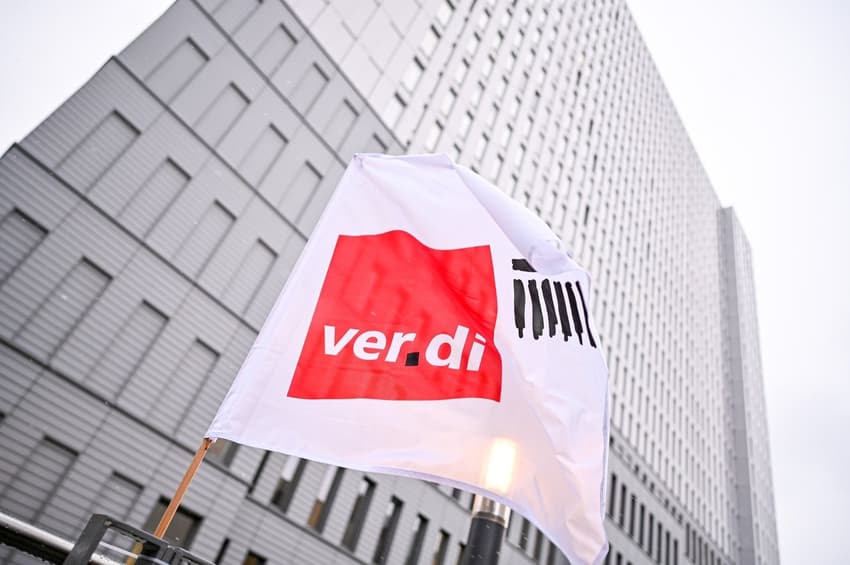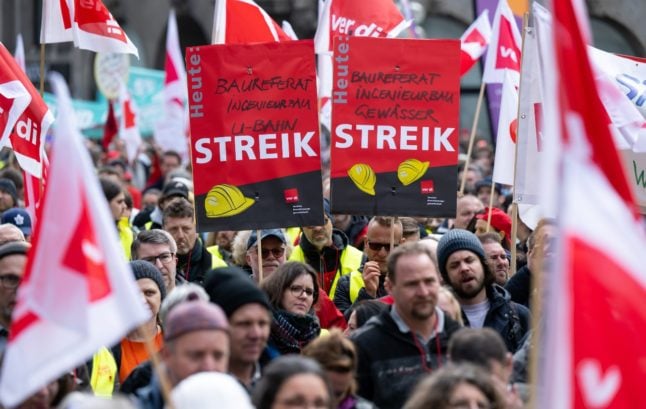German unions call major nationwide transport strike for Monday

German unions called a major transport strike for Monday, March 27th as workers demand higher wages to cope with surging inflation, the latest industrial action in Europe's top economy.
Staff at airports, ports, the railways, buses and subways will walk out during the 24-hour strike, which will start at midnight in the early hours of Monday and last all day Monday, the Verdi and EVG unions announced on Thursday.
For the first time, the unions also want to shut down portions of Germany's motorway, the Autobahn. This could technically possible via the federally owned Autobahn GmbH, whose staff will also participate in the action.
"We think there will be extensive participation in the strike," Verdi chief Frank Werneke told a press conference.
It follows a series of strikes in recent months in Germany in numerous areas, from the postal service to airports and local transport.
Like in many other countries, Germans are struggling with surging inflation after Russia's invasion of Ukraine sent food and energy costs soaring.
Verdi represents some 2.5 million public sector employees, while EVG represents workers on the railways and at bus companies.
It is rare for unions to join forces to call a strike in Germany, and it follows a series of failed talks with employers in recent weeks.
Who and where in Germany will be most affected?
Strikes will occur in every state and city where Verdi and EVG have a strong nationwide presence, which is the case in most Bundesländer except Bremen and Hamburg.
In the cities and districts on strike, buses, trams and underground trains may no longer run. Express and school buses would also be affected, as well as the state-owned Deutsche Bahn and other railway companies.
Verdi is also calling for work stoppages at several airports and in public transport in the states of Hesse, North Rhine-Westphalia, Baden-Württemberg, Saxony, Lower Saxony, Rhineland-Palatinate and Bavaria. The motorway company Autobahn GmBH is also to go on strike, as well as the water and shipping administration.
In addition to Deutsche Bahn, the rail companies affected include Transdev, AKN, Osthannoversche Eisenbahnen, erixx, vlexx, eurobahn and Die Länderbahn, according to EVG.

A Deutsche Bahn ICE train travels along a railway line in the Hanover region. Photo: picture alliance/dpa | Julian Stratenschulte
According to the unions, the warning strikes at airports concern, on one hand, the negotiations for public service workers, on the other hand local negotiations for ground handling workers as well as the nationwide negotiations for aviation security workers.
The 'Mega-Strike', as its dubbed in Germany, on March 27th could be a harbinger of another strike wave around the Easter holidays, which start on Thursday, April 6th this year.
READ ALSO: EXPLAINED: Why travel chaos from transport strikes in Germany could get worse
What are the unions demanding?
The last wage agreement between Deutsche Bahn and EVG was concluded back in 2021, and this agreement is set to expire this year.
To replace it, the union is calling for a new agreement that includes a 12 percent pay increase for workers - amounting to at least €650 extra per month for senior employees and €325 more per month for junior employees. This could boost the pay packets of around 180,000 workers.
Meanwhile, Verdi has been engaged in tough negotiations for around 2.5 million workers in the pubic sector for several weeks.
They're asking for a 10.5 percent pay increase amounting to at least €500 per month for employees in local administration, hospitals, local transport, waste disposal and other public-sector jobs.
In the last round of negotiations in late February, employers offered a pay increase of five percent alongside inflation compensation bonuses totalling €2,500.
Verdi rejected this offer, describing it as "an insult" and "declaration of war" on its members. The next round of negotiations is set to take place between March 27th and 29th.
"For the third round of negotiations, Verdi is now once again increasing the pressure on the employers to present a negotiable offer that meets the demands of the workers," the union said in a press release Thursday.

Public sector workers take part in demos during warning strikes in Munich. Photo: picture alliance/dpa | Sven Hoppe
Deutsche Bahn, meanwhile, criticised the strike action as "baseless and unnecessary".
"The EVG must face up to its responsibility and return to the negotiating table immediately," the company said in a press release put out on Thursday. "Our employees and passengers need a swift solution now, not a big warning strike. We have made a responsible offer and are ready to talk at any time."
However, EVG remained defiant.
"The railway companies, like the bus companies of Deutsche Bahn, are running out of employees. One reason for this is the poor pay," said EVG chairman Martin Burkert in a statement on Thursday.
"Already today, bus and train connections are cancelled time and again because jobs are unfilled or colleagues have fallen ill due to the high workload."
READ ALSO: EXPLAINED: Why are there so many strikes in Germany right now?
Part of an ongoing strike wave
In the past weeks and months, public sector workers all over Germany have been going on strike, leading to the closure of public institutions, as well as numerous transport cancellations and delays. Verdi estimates that 400,000 of its members nationwide have taken part in the actions.
A countrywide strike, however, is a rare event in Germany.
Local and long-distance transport, as well as airports all over Germany, were struck simultaneously more than 30 years ago in the course of a strike lasting several weeks.
During this tough industrial action in the public sector in spring 1992, several hundred thousand workers temporarily stopped work.
Comments
See Also
Staff at airports, ports, the railways, buses and subways will walk out during the 24-hour strike, which will start at midnight in the early hours of Monday and last all day Monday, the Verdi and EVG unions announced on Thursday.
For the first time, the unions also want to shut down portions of Germany's motorway, the Autobahn. This could technically possible via the federally owned Autobahn GmbH, whose staff will also participate in the action.
"We think there will be extensive participation in the strike," Verdi chief Frank Werneke told a press conference.
It follows a series of strikes in recent months in Germany in numerous areas, from the postal service to airports and local transport.
Like in many other countries, Germans are struggling with surging inflation after Russia's invasion of Ukraine sent food and energy costs soaring.
Verdi represents some 2.5 million public sector employees, while EVG represents workers on the railways and at bus companies.
It is rare for unions to join forces to call a strike in Germany, and it follows a series of failed talks with employers in recent weeks.
Who and where in Germany will be most affected?
Strikes will occur in every state and city where Verdi and EVG have a strong nationwide presence, which is the case in most Bundesländer except Bremen and Hamburg.
In the cities and districts on strike, buses, trams and underground trains may no longer run. Express and school buses would also be affected, as well as the state-owned Deutsche Bahn and other railway companies.
Verdi is also calling for work stoppages at several airports and in public transport in the states of Hesse, North Rhine-Westphalia, Baden-Württemberg, Saxony, Lower Saxony, Rhineland-Palatinate and Bavaria. The motorway company Autobahn GmBH is also to go on strike, as well as the water and shipping administration.
In addition to Deutsche Bahn, the rail companies affected include Transdev, AKN, Osthannoversche Eisenbahnen, erixx, vlexx, eurobahn and Die Länderbahn, according to EVG.

According to the unions, the warning strikes at airports concern, on one hand, the negotiations for public service workers, on the other hand local negotiations for ground handling workers as well as the nationwide negotiations for aviation security workers.
The 'Mega-Strike', as its dubbed in Germany, on March 27th could be a harbinger of another strike wave around the Easter holidays, which start on Thursday, April 6th this year.
READ ALSO: EXPLAINED: Why travel chaos from transport strikes in Germany could get worse
What are the unions demanding?
The last wage agreement between Deutsche Bahn and EVG was concluded back in 2021, and this agreement is set to expire this year.
To replace it, the union is calling for a new agreement that includes a 12 percent pay increase for workers - amounting to at least €650 extra per month for senior employees and €325 more per month for junior employees. This could boost the pay packets of around 180,000 workers.
Meanwhile, Verdi has been engaged in tough negotiations for around 2.5 million workers in the pubic sector for several weeks.
They're asking for a 10.5 percent pay increase amounting to at least €500 per month for employees in local administration, hospitals, local transport, waste disposal and other public-sector jobs.
In the last round of negotiations in late February, employers offered a pay increase of five percent alongside inflation compensation bonuses totalling €2,500.
Verdi rejected this offer, describing it as "an insult" and "declaration of war" on its members. The next round of negotiations is set to take place between March 27th and 29th.
"For the third round of negotiations, Verdi is now once again increasing the pressure on the employers to present a negotiable offer that meets the demands of the workers," the union said in a press release Thursday.

Deutsche Bahn, meanwhile, criticised the strike action as "baseless and unnecessary".
"The EVG must face up to its responsibility and return to the negotiating table immediately," the company said in a press release put out on Thursday. "Our employees and passengers need a swift solution now, not a big warning strike. We have made a responsible offer and are ready to talk at any time."
However, EVG remained defiant.
"The railway companies, like the bus companies of Deutsche Bahn, are running out of employees. One reason for this is the poor pay," said EVG chairman Martin Burkert in a statement on Thursday.
"Already today, bus and train connections are cancelled time and again because jobs are unfilled or colleagues have fallen ill due to the high workload."
READ ALSO: EXPLAINED: Why are there so many strikes in Germany right now?
Part of an ongoing strike wave
In the past weeks and months, public sector workers all over Germany have been going on strike, leading to the closure of public institutions, as well as numerous transport cancellations and delays. Verdi estimates that 400,000 of its members nationwide have taken part in the actions.
A countrywide strike, however, is a rare event in Germany.
Local and long-distance transport, as well as airports all over Germany, were struck simultaneously more than 30 years ago in the course of a strike lasting several weeks.
During this tough industrial action in the public sector in spring 1992, several hundred thousand workers temporarily stopped work.
Join the conversation in our comments section below. Share your own views and experience and if you have a question or suggestion for our journalists then email us at [email protected].
Please keep comments civil, constructive and on topic – and make sure to read our terms of use before getting involved.
Please log in here to leave a comment.